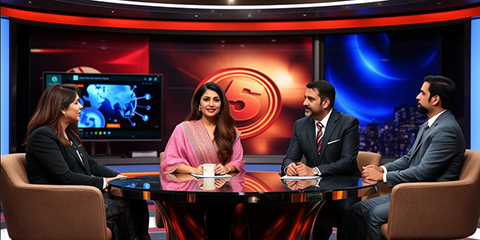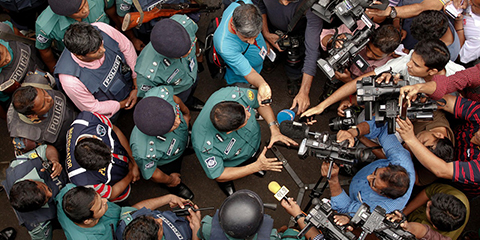20 Pakistani journalists who joined governments
JournalismPakistan.com | Published 3 years ago | Daud Malik
Join our WhatsApp channel
ISLAMABAD—Syed Fahd Husain is the latest addition to the list of Pakistani journalists accepting an official position in or outside the country or joining a political party and becoming ministers.
The Society of Professional Journalists in the United States is clear on the question of journalists engaging in political activity. "Don't do it. Don't get involved. Don't contribute money, don't work in a campaign, don't lobby, and especially, don't run for office yourself."
Additionally, society wants journalists to avoid conflict of interest, real or perceived, and that journalists should remain free of associations that may compromise integrity or damage credibility. However, in Pakistan, we have a long list of journalists who have accepted official positions.
This list can start with Altaf Gauhar, who served as the information secretary of the first military ruler General Ayub Khan.
Born in Gujranwala to a family of a minor official, the eldest of five children before the partition "was a broadcaster on All India Radio; after it, he was one of Pakistan's first civil servants. He was appointed first secretary of the state bank, moving to become a magistrate in East Pakistan (now Bangladesh) and later its deputy home secretary."
As the information secretary of President Ayub, he was "given unprecedented powers to manage the press." Guardian newspaper says that during his tenure, draconian laws governing the press were passed, something for which Gauhar later publicly apologized. He became editor of Dawn in 1969 and was twice imprisoned during the tenure of late Prime Minister Zulfiqar Ali Bhutto, who was serving as the country's first martial law administrator in 1971.
However, Zamir Niazi, author of The Press in Chains, holds Gauhar responsible for institutionalizing curbs on the freedom of the press. "Whether or not Gauhar was the architect of the black press laws, the NPT, the takeover of the APP, re-introduction of the press advice system and many other 'other ways to crack the whip to keep the press in check and under control,' he cannot deny the hard fact that he 'worked often long into the night and made valuable contribution in smoothing the rough edges and made press controls into an institution."
Gauhar died on November 14, 2002.
The next name that comes to mind is Z A Suleri. According to Khalid Hasan, the veteran journalist who passed away in 1999 was made head of Inter-Services Public Relations in 1965. Suleri also briefly served as additional secretary of the information ministry during the government of late Gen Ziaul Haq.
Hasan did not have kind words for Suleri. "Suleri did more harm to a free press in Pakistan, to civil liberties and the idea of a representative government in all the years he was in positions of editorial authority than any other individual one can cite. Every authoritarian government needed a Suleri and every authoritarian government got him."
In 1971 President Zulfiqar Ali Bhutto asked eminent poet Faiz Ahmed Faiz to "organize and head the Pakistan National Council of the Arts in Islamabad…." Hasan says two years later, Faiz returned to Lahore as a consultant on culture to the Government of Pakistan. "Besides organizing a music research cell and heading a commission on cultural planning, Faiz was asked to represent the country in a number of international conferences. After the military takeover of General Zia-ul-Haq in 1977, Faiz resigned."
Faiz, who became the first editor of Pakistan Times in 1947, also headed "the editorial boards of the Times' sister publications, the Urdu daily Imroze and the Urdu literary and political weekly, Lail o-Nahar," according to Hasan.
Arrested in 1951 in the infamous Rawalpindi Conspiracy case, Faiz returned to Pakistan Times in 1955 when its editor was Mazhar Ali Khan.
In December 1971, Zulfiqar Ali Bhutto asked Khalid Hasan to serve as his press secretary. Hasan also served in the foreign service with postings in Paris, Ottawa, and London for five years. He resigned when the government of Prime Minister Z A Bhutto was ousted in a military coup by Gen Ziaul Haq for the next 11 years.
Irshad Ahmed Haqqani, a known columnist and senior editor of daily Jang, opted to become minister of information in the caretaker government of Prime Minister Meraj Khalid in 1997.
Javed Jabbar introduces himself as a "writer, filmmaker, policy analyst, former Senator and federal minister" on his website. Apart from contributing articles for Dawn and The News, Jabbar recently authored a book, "But, Prime Minister," focusing on his days as the state minister for information and the minister for science and technology in the cabinet of Prime Minister Benazir Bhutto in 1988.
In 2001, Jabbar joined the military government of Gen Pervez Musharraf. His first portfolio was information and media development, followed by Kashmir Affairs and Northern Areas.
PMLN Senator Mushahid Hussain Sayed made a name for himself as the editor of The Muslim, the first independent English daily from Islamabad in the early 1980s. He was only 29 when he was editor of The Muslim. On his website, he introduces himself as "a journalist, geo-strategist, politician, and an avid writer and reader."
Son of a military officer, Mushahid did his bachelor's in journalism from the Forman Christian College University in 1974. In 1988, he lost his job at The Muslim when he took late respected Indian journalist Kuldip Nayar to interview Dr. Abdul Qadeer Khan.
According to Abbas Nasir, "Mushahid Hussain, who was then the editor of the influential Islamabad newspaper, The Muslim, took the Indian journalist to A. Q. Khan's home for the interview at the end of January that year when relations between the two countries were strained."
Mushahid joined the first government of PML-N in 1990 as an adviser on external publicity and foreign affairs to the prime minister. He became a senator in 1997. In the second government of PML-N, he served as the minister of information. After the government was ousted on October 12, 1999, in a military coup, Mushahid was incarcerated for almost two years.
After release from the incarceration, Mushahid switched parties and joined the ruling Pakistan Muslim League (Quaid-e-Azam). He remained an avid supporter of President Gen Pervez Musharraf and the PMLQ government. In 2018, however, he was back in PML-N.
Wajid Shamsul Hasan, who died in 2021, served as Pakistan's envoy in the UK in two stints during the Pakistan Peoples Party (PPP) governments – first from 1993 to 1996 and second from 2008 to 2013. He joined the Jang Group in 1962 and became editor of The Daily News in 1969. He also edited The Weekly MAG from Karachi.
Terming him a Bhutto loyalist, Farhatullah Babar remembers Wajid as "a great humanist, a genuine democrat, a fearless journalist, an unpretentious diplomat, a committed Bhutto loyalist and a friend in need to many." He passed away in London while living in exile for over two decades. Wajid also served as the chairman of NPT.
Maleeha Lodhi, who served as the first editor of The News back in 1989, was appointed as Pakistan's envoy to the United States by the second government of Prime Minister Benazir Bhutto. In 1999 President Pervez Musharraf reappointed her in the same position where she served till 2002. The following year, President Musharraf appointed her as Pakistan's High Commissioner to the UK. In 2015, she became the first woman to serve as Pakistan's Permanent Representative to the United Nations. The former editor of The News now writes a weekly column for Dawn.
Currently serving as the federal minister for climate change, Sherry Rehman started her journalistic career with The Daily Star. She became editor of the Herald when she was only 26. After leaving the monthly magazine in 1998, Sherry authored a book - The Kashmiri Shawl: From Jamawar to Paisley. In 2002 she became a member of the National Assembly on a reserved seat on a Pakistan Peoples Party (PPP) ticket.
When PPP formed the government in 2008, she was part of the cabinet of Prime Minister Yousaf Raza Gilani, holding the portfolios of women's development, culture, health, and information. She resigned as minister of information over restrictions on journalists. She was appointed Pakistan's envoy to the US after the memogate scandal, which saw Hussain Haqqani bowing out of Pakistan's embassy. Sherry became a senator in 2015.
Najam Sethi, a former editor of Daily Times and owner of weekly The Friday Times, became the caretaker chief minister of Punjab in 2013. Afterward, the PMLN government appointed him the chief of the Pakistan Cricket Board, where he is credited for launching the T-20 Pakistan Super League. However, before that, the chairman of Pakistan Tehreek-e-Insaf, Imran Khan, accused him of being part of alleged rigging in the 2013 general elections.
In May 1999, during the second government of PML-N, Sethi was arrested for an interview he gave to the BBC television program, Correspondent. Thought to be arrested by ISI, he was released on June 3, 1999.
His wife Jugnu Mohsin, editor of the Friday Times, was elected to the Punjab Assembly from Okara as an independent in the 2018 general elections. She joined PMLN in 2022. Most of the satire in The Friday Times, it is said, is the brainchild of Jugnu. This included Ittefaqnama (Nawaz Sharif's diary in exile), IM the Dim, Diary of a Social Butterfly, and Mush and Bush.
Hussain Haqqani has the distinction of serving in PML-N and the PPP governments. He was appointed as political advisor to then Prime Minister Nawaz Sharif in his first government (1990-93). Haqqani was appointed envoy to Sri Lanka in 1992.
After Benazir Bhutto became prime minister for the second time in 1993, Haqqani was appointed as her spokesperson. In 1995, he headed the House Building Finance Corporation. He became Pakistan's envoy to the US in 2008. In 2011, the memogate scandal ended his ambassadorship.
Late Mazhar Ali Khan made no secret about disliking Haqqani.
In one of his columns for his weekly magazine The Viewpoint, Khan harshly criticized Haqqani for trying to find dirt on Benazir Bhutto during the first government of Nawaz Sharif in 1992. Haqqani, at that time, was serving as political adviser to Sharif.
Khan's Between the Line (BTL) column in The Viewpoint on February 6, 1992, starts by giving Haqqani's side of the story. "Nawaz Sharif's special media expert has boldly denied all the Press reports charging that, on a recent visit to India, he was engaged in trying to find 'suitable' material for a book on Benazir Bhutto—as part of continuing IJI effort to malign the Leader of the Opposition and lower her position in public esteem."
The details of denial continue. "The whiz kid Haqqani – not to be confused with the respected columnist who bears the same surname – has stated that the Indian Press reports were complete fabrications, and that he was not involved in any such project which also sought an Indian journalist to author the book."
However, afterward, Khan gets angry with Haqqani.
"Haqqani's reputation, his reputed close association with the yellow rag Facts and his involvement in a host of other dirty tricks on behalf of his employees—which included planting stories about Prime Minister Bhutto's request for Indian troops to advance to Pakistan's borders—deprive him of whatever credibility he may have enjoyed when he was a Jamaat stalwart. The truth about his latest venture will certainly be established beyond any doubt sooner or later."
The column maintained that such tactics only degrade the level of politics. "However, it needs to be repeated that such low tactics degrade Pakistani politics and further weaken the people's faith in the diarchic system that they have been compelled to accept—mostly on the ground that, at any rate, it is better than Martial Law."
Mazhar Ali Khan died in January 1993. In the same year, PPP formed the government after the general elections. One of the advisors of Prime Minister Benazir Bhutto was Hussain Haqqani.
During the tenure of the PPP government, Shahid Masood was appointed chairman of the PTV with the additional charge of managing director in June 2008. He resigned in November 2008 and was appointed as special assistant to then Prime Minister Yousaf Raza Gilani. According to media reports, Information Minister Sherry Rehman was not happy with Masood, saying he was not following directives from the ministry.
Masood, who had worked with leading TV channels in Pakistan in top positions, was arrested in 2018 by FIA for an alleged PTV corruption case. Earlier in 2017, his talk show on BOL TV was banned by PEMRA for "making baseless allegations against the Pakistan Army and the federal ministers for finance and defence." Nowadays, he does a talk show on GNN TV.
Ataul Haq Qasmi, a playwright and columnist, was appointed envoy to Norway and Thailand during the second government of Prime Minister Nawaz Sharif. In the third government of Nawaz Sharif, he was made the head of PTV, where he also appointed himself as the organization's managing director. A Supreme Court verdict forced his ouster from the PTV in 2018.
According to Dawn, "The verdict not only termed Mr Qasmi's appointment illegal but also held the appointing authorities — then information minister Pervez Rashid, finance minister Ishaq Dar and Mr Fawad — guilty of making the appointment. It also ordered that Rs197.8m be recovered from them."
In the third government of Prime Minister Nawaz Sharif, Absar Alam, who had worked with mainstream newspapers and TV channels, was appointed chairman of PEMRA in October 2015. The Lahore High Court nullified his appointment as illegal.
Afterward, Alam announced he was part of PML-N and became a fierce opponent of the previous Pakistan Tehreek-e-Insaf government led by Imran Khan. In April 2021, he claimed that unknown men had shot him in the ribs. He had openly opposed then ISI Chief General Faiz Hameed on social media.
Columnist Ayaz Amir joined PML-N before the 2008 general elections and won the National Assembly seat from the Chakwal constituency. However, during his five years in the National Assembly, he remained a backbencher. When he joined the PML-N and announced to contest the elections, he was shocked when Dawn told him that he could not continue his weekly column. In his last column on December 21, 2007, he maintained: "Contesting these elections, I am informed, spells the end of my long association with this newspaper. If it is to continue it will have to be in some other form. A harsh price to pay and, as I said, my heart is torn."
Later, he wrote a column for The News. Nowadays, he writes in Urdu for daily Dunya and appears on a talk show on Dunya TV. Afterward, he stopped writing articles in English.
Ayaz, who left politics after 2013, linked his foray into politics to local necessities of his constituency. "To politics I am drawn not out of any lure of high political office, which I don't particularly cherish, but because of local necessity. A one-sided political field, with all the president's men on one side and no credible challenge on the other side, drew me into the election race in 2002: to even out the political scales."
In recent times, Mushtaq Minhas, a co-host of a popular talk show Bolta Pakistan on Aaj TV, joined PML-N in Azad Kashmir and became a member of the legislative assembly. He was Minister for Information in the cabinet of AJK Prime Minister Raja Farooq Haider Khan. He lost his seat in the state elections in 2021.
Irfan Siddiqui became a senator on a PML-N ticket in 2021. Earlier in 2014, he was a special assistant to Prime Minister Nawaz Sharif on national affairs. In July 2019, Siddiqui was arrested under the tenancy law in Islamabad.
In his parting article in Dawn, Ayaz Amir tried to justify journalists dabbling in politics and politicians trying their hand at journalism. But he also highlighted the pitfalls, mainly using journalism "at the service of a particular political party," and thought it could be one of the roads to hell.
"Journalism and politics are ultimately about the same thing: public affairs and the managing of society, how best to achieve the golden mean. True, a conflict of interest arises if journalism becomes a tool of propaganda, there being nothing worse than putting journalism at the service of a particular political party, singing the praises of this leader or that. But journalism can be turned into a tool of propaganda even without wearing a party label or holding a party office or running for political office from the platform of a political party. There is no single road which leads to hell."

























